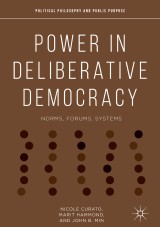Details

Power in Deliberative Democracy
Norms, Forums, SystemsPolitical Philosophy and Public Purpose
|
96,29 € |
|
| Verlag: | Palgrave Macmillan |
| Format: | |
| Veröffentl.: | 10.10.2018 |
| ISBN/EAN: | 9783319955346 |
| Sprache: | englisch |
Dieses eBook enthält ein Wasserzeichen.
Beschreibungen
<p></p><p>Deliberative democracy is an embattled political project. It is accused of political naiveté for it only talks about power without taking power. Others, meanwhile, take issue with deliberative democracy’s dominance in the field of democratic theory and practice. An industry of consultants, facilitators, and experts of deliberative forums has grown over the past decades, suggesting that the field has benefited from a broken political system.</p><p>This book is inspired by these accusations. It argues that deliberative democracy’s tense relationship with power is not a pathology but constitutive of deliberative practice. Deliberative democracy gains relevance when it navigates complex relations of power in modern societies, learns from its mistakes, remains epistemically humble but not politically meek. These arguments are situated in three facets of deliberative democracy—norms, forums, and systems—and concludes by applying these ideas to three of the most pressing issues in contemporary times—post-truth politics, populism, and illiberalism.<br></p><div><br></div><p></p>
1. Introduction.- 2. Norms.- 3. Forums.- 4. Systems.- 5. Deliberative Democracy in Dark Times .- 6. Conclusion.
<div><b>Nicole Curato</b> is a Senior Research Fellow at the Centre for Deliberative Democracy and Global Governance at the University of Canberra, AU.<br><br></div><div><b>Marit Hammond </b>is Lecturer in Politics at Keele University, UK.<br><br></div><div><b>John B. Min</b> is Philosophy Instructor (equivalent to Assistant Professor of Philosophy) in the Department of Social Sciences at the College of Southern Nevada, USA.</div><div><br></div>
<p>Deliberative democracy is an embattled political project. It is accused of political naiveté for it only talks about power without taking power. Others, meanwhile, take issue with deliberative democracy’s dominance in the field of democratic theory and practice. An industry of consultants, facilitators, and experts of deliberative forums has grown over the past decades, suggesting that the field has benefited from a broken political system.</p><p>This book is inspired by these accusations. It argues that deliberative democracy’s tense relationship with power is not a pathology but constitutive of deliberative practice. Deliberative democracy gains relevance when it navigates complex relations of power in modern societies, learns from its mistakes, remains epistemically humble but not politically meek. These arguments are situated in three facets of deliberative democracy—norms, forums, and systems—and concludes by applying these ideas to three of the most pressing issues in contemporary times—post-truth politics, populism, and illiberalism.<br></p><div><br></div>
Covers major debates and developments in deliberative democracy Provides a thematic overview of the various ways in which power has been conceptualized in deliberative democracy Recognizes the neglected tensions between deliberative democracy’s potential to both perpetuate and curb coercive power
Covers major debates and developments in deliberative democracy<div><div>Provides a thematic overview of the various ways in which power has been conceptualized in deliberative democracy</div></div>
“This book confronts the realist challenge head-on and makes a thorough and compelling case for the relevance and importance of deliberative democracy in a world full of power, coercion, and strategy. Equal parts comprehensive introduction and sophisticated defense, the authors present deliberative democracy in a new and powerful light. The book is sure to be a must-read in the growing field of deliberative democracy studies.” (Simone Chambers, Professor, Political Science, University of California Irvine, USA)<p>“In their admirably clear and nuanced book, Curato, Hammond and Min place the concept of deliberative democracy where it belongs: at the centre of the complex realities of political and social power. This opens up new normative as well as empirical perspectives in critical democratic theory, much needed in a time of worries about the future of democracy.” (Rainer Forst, Professor, Political Theory and Philosophy, Goethe University Frankfurt, Germany)<br></p>
<p>“Foranyone keen to understand where and how power fits into deliberative democracy, this book is a must-read. The authors offer a clear-eyed assessment of how coercive and productive forms of power feature in the norms, forums and systems of public deliberation. More broadly the book makes a timely and important contribution to debates on the relevance of deliberative democracy for modern societies beset with complex power relationships.” (Carolyn M. Hendriks, Associate Professor, Public Policy and Governance, Australian National University, Australia<b>)</b><br></p>
<p>“This book is a must-read for people interested in democratic theory. Its most important contribution is to address the problem of power in deliberative democracy, often regarded as the weakest point of previous literature. This book also offers a robust and refined picture of deliberative democracy.” (Tetsuki Tamura, Professor, Political Science, Nagoya University, Japan)<br></p>
<p> </p>
<p>“Foranyone keen to understand where and how power fits into deliberative democracy, this book is a must-read. The authors offer a clear-eyed assessment of how coercive and productive forms of power feature in the norms, forums and systems of public deliberation. More broadly the book makes a timely and important contribution to debates on the relevance of deliberative democracy for modern societies beset with complex power relationships.” (Carolyn M. Hendriks, Associate Professor, Public Policy and Governance, Australian National University, Australia<b>)</b><br></p>
<p>“This book is a must-read for people interested in democratic theory. Its most important contribution is to address the problem of power in deliberative democracy, often regarded as the weakest point of previous literature. This book also offers a robust and refined picture of deliberative democracy.” (Tetsuki Tamura, Professor, Political Science, Nagoya University, Japan)<br></p>
<p> </p>


















